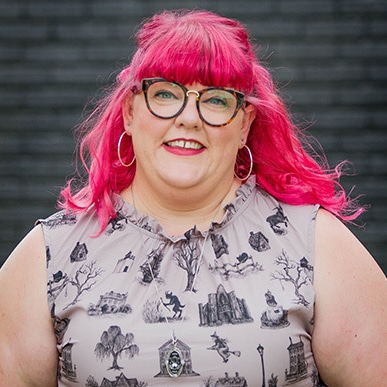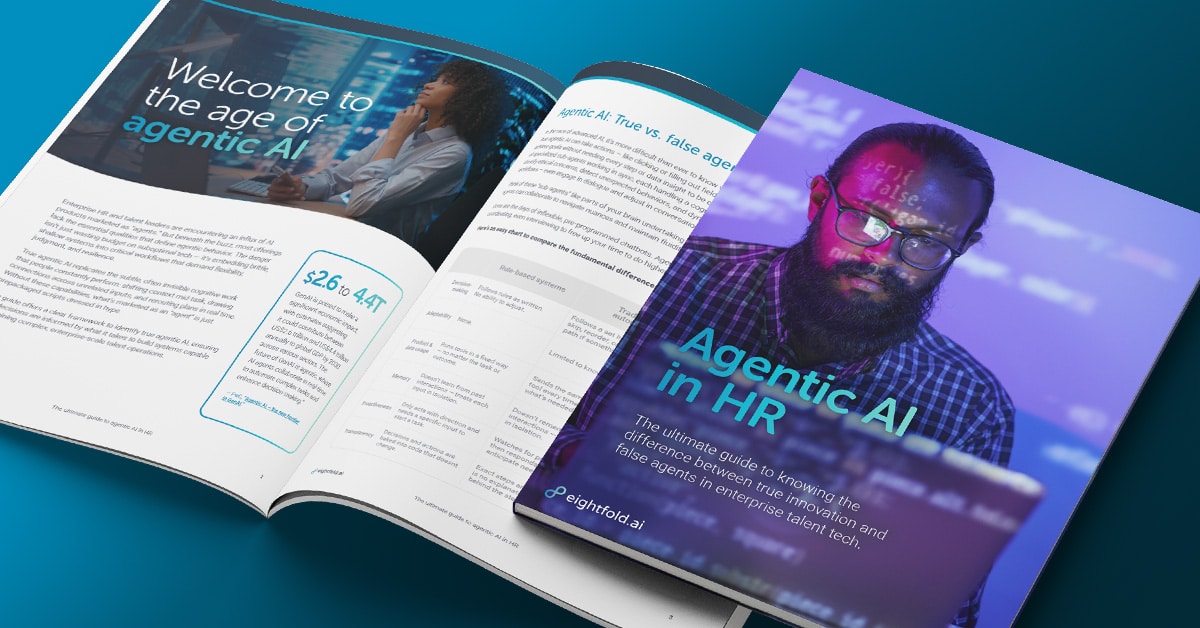- Agentic AI is changing everything — and HR is in the driver’s seat to help redefine how work gets done within their organizations.
- Skills-based strategies are no longer the future — these are essential now. Organizations that have already transformed are seeing the long-term benefits of this shift.
- Meeting business outcomes is critical, but continuing to unlock human potential is the ultimate goal of adopting talent intelligence.
What if the future of work isn’t just about better business outcomes but about solving real human problems?
That question set the tone for this year’s Cultivate ’25, where Chano Fernandez, Co-CEO of Eightfold, took the stage for a keynote address that was as energizing as it was thought-provoking.
Speaking to a packed room, Fernandez walked the audience through how agentic AI is transforming decision-making, why HR has a unique opportunity to lead this change, and how customers like Bristol Myers Squibb are using skills-based strategies to create more agile, people-centered organizations.
Along the way, he served up a few great metaphors (chef vs. cook? — more on that to come), shared some staggering business impact numbers, and reminded us all of the deeper mission: this isn’t just about streamlining processes — it’s about unlocking human potential.
Related content: Eightfold Co-CEO Chano Fernandez takes a look back at everything Eightfold has accomplished since Cultivate ’24.
Reflecting on a year of innovation and partnership
Since last year’s Cultivate, Fernandez highlighted how Eightfold has been busy translating customer insights into tangible outcomes. We’ve launched Talent Tracking, an AI-native solution that reimagines legacy ATS through access to real-time data, and unveiled Talent Design, a framework that helps organizations unify and activate skills across their workforces.
Beyond new features, we’ve focused on simplifying the entire talent process: streamlining configuration, improving admin tools, and ensuring that AI adoption is intuitive and impactful.
“You asked us to make it easier,” Fernandez said. “We listened, and we invested heavily to make that happen.”
In total, Eightfold delivered more than 150 product updates in the last year. That progress, he said, is just the beginning.
The power of partnerships, both with customers and ecosystem collaborators, was also key to where we are now. We launched a Partner Advisory Board, revamped training curriculum, and expanded customer listening programs to ensure innovation is closely aligned with market needs.
“We’re not building in a vacuum,” he said. “We’re building together.”
A new online community is also helping to foster real-time collaboration, support, and shared learning across the Eightfold user base.
These touchpoints are designed to ensure customers don’t just implement AI — they realize its full strategic potential.
Related content: Eightfold Co-CEO Chano Fernandez explains what is and is not agentic AI using a clever kitchen analogy.
From automation to agentic AI
As the AI conversation turns to the future, Fernandez made it clear: agentic AI is not a trend. It’s a tectonic shift.
“AI is no longer hype,” he said. “It’s in boardrooms, it’s in strategy decks, and it’s at the top of every CEO’s agenda.”
But for many organizations, the path forward is unclear. What does agentic AI mean for business models, workforce strategy, or even for leadership itself?
To illustrate the difference between traditional automation and agentic AI, Fernandez used a cooking metaphor: “I follow a recipe like a machine, but a great chef? A chef improvises. They taste, they adjust, they create something new.”
Agentic AI is the chef, ready to cook up something new and exciting for you. It doesn’t just automate tasks. It makes decisions, recalls past data to inform current workflows, and adapts in real time.
And that, Fernandez said, changes everything.

Rethinking organizational design
This shift to using agentic AI has deep implications for the way work is structured. Hierarchies, job architectures, and team designs are built around human decision-making. But when AI can access information instantly and act autonomously, those structures need to evolve.
“It’s not just about being faster or cheaper,” Fernandez said. “It’s about reimagining how work gets done and who does it.”
In this transformation, HR has a critical role to play.
“HR has the opportunity and the responsibility to lead,” he said. “We must have a seat at the table. We must lead from the front.”
Real impact, real ROI
To bring this vision to life, Fernandez welcomed Melissa Keiser, Executive Director of Global Skills and Career Development Strategy at Bristol Myers Squibb (BMS), to the stage.
Keiser shared BMS’s journey to becoming a skills-driven organization — one rooted in solving real business problems that the organization was just launching a year ago.
“We didn’t start by saying, ‘Let’s do a skills transformation,’” she said. “We started by addressing a talent shortage in a critical area: cell therapy.”
This team, with a unique and specialized skill set, had roles sitting vacant for over six months. By using a skills-based hiring approach and focusing on transferable capabilities, BMS reduced time to fill by 21% in just 16 weeks.
The success of that early adoption became a springboard for global change. Within a year, BMS rolled out its talent marketplace to a third of its 30,000-person workforce.
Employees responded with enthusiasm — 78% created talent profiles within the first six months, eager for greater transparency and career development.
“We listened to our people,” Keiser said. “They wanted better visibility into career paths, and we delivered.”
Scaling with strategy and heart
The ROI didn’t stop there. As BMS faced organizational shifts, Keiser says the company was able to redeploy more than 500 employees into new roles, retaining institutional knowledge, and saving millions of dollars.
“Don’t wait to get it perfect,” Keiser said. “Start with a real business challenge. Learn, scale, and keep your focus on solving for people.”
The transformation continues. Before the end of May 2025, BMS will launch development planning globally, deepening conversations between employees and managers about growth and future roles. Strategic workforce planning and skills-based learning initiatives are also underway.
“We’re now using skills data as the backbone of all our talent solutions,” Keiser said. “That’s how we’re unlocking potential across the organization.”
Building for what’s next
Fernandez closed with a return to the big picture: Eightfold’s vision to pioneer the talent intelligence category, which is grounded in responsible AI, global scale, and deep partnerships.
“Each customer represents a story,” he said. “When you do transformation right, with the right partners, you get better outcomes. Not just for the business but for the people inside it.”
With an average reduction in time to fill by mature TA customers reducing to 20.4 days and a Net Promoter Score of 76 for the Eightfold candidate experience, the data speaks for itself. But the real story is human.
“At Eightfold, we’re not just solving organizational problems,” Fernandez said. “We’re solving people problems, and that’s the most inspiring work of all.”
Missed Cultivate ’25 in the U.S.? Catch our leaders’ keynotes in London on June 10.



